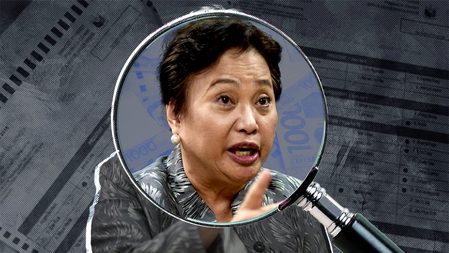SUMMARY
This is AI generated summarization, which may have errors. For context, always refer to the full article.
![[Vantage Point] Who will prosecute the prosecutor?](https://www.rappler.com/tachyon/2024/01/Who-prosecutes-prosecutor-January-18-2024.jpg)
The Office of the Ombudsman’s swift action to dismiss former Manila International Airport Authority (MIAA) chief Cesar Chiong last year received a tsunami of backlash from a stunned business sector.
Chiong’s sin, according to the Ombudsman, was “reassigning 285 MIAA employees [clearly a management prerogative] without any basis.” This “misconduct,” the Ombudsman reasoned, was “a grave abuse of authority.” The dismissal sprang from a complaint of an anonymous tipster who, of course, the Ombudsman would not identify. Charged along with Chiong was MIAA assistant general manager Irene Montalbo.
Chiong brought his grievance to the Court of Appeals (CA), which has yet to issue a decision. While his case was pending with the CA, the Ombudsman went for the jugular to perpetually disqualify him from government service.
More recently, the Ombudsman also recommended the filing of a graft case against former Commission on Elections (Comelec) commissioner Rowena Guanzon for her act of publicizing her dissenting opinion in the Comelec ruling that allowed then-presidential candidate Ferdinand Marcos, Jr. to run in 2022. From my vantage point, Guanzon’s dissent was not in any way related to corruption.
Guanzon was found to be liable for two counts of graft for “prematurely disclosing confidential information.” Guanzon’s “misdeed” was seen by the Ombudsman as violative of the Anti-graft and Corrupt Practices Act which, under RA No. 3019, is a deterrent against anomalous transaction involving public money [Section 3(e) and 3(g).]
The Ombudsman reasoned: “Disclosing votes ahead of promulgation are deemed unethical because they might be seen as trying to influence or pressure the other voting members. Rules are in place to ensure that the leakage of such information will not affect the integrity of courts or quasi-judicial bodies.”
But did Guanzon’s action amount to graft? If you ask me, she could have been at the very least cited for contempt. A graft indictment? Well…
Tobacco fund mess
Remember the heated hearings that captivated our nation during the investigation by the House of Representatives of Imee Marcos’ alleged involvement in corruption during her time as Ilocos Norte governor?
As the gavel fell on the final session, a resolution was passed, directing the Ombudsman to investigate the issue further. But what happened next? Has the resolution borne any fruit, or has is it simply now been gathering dust in the bowels of bureaucracy?
In May 2017, the House committee on good government and public accountability investigated the alleged misuse of tobacco excise tax funds between 2010 and 2016 in the province of Ilocos Norte. The period covered the first two gubernatorial terms of Senator Imee Marcos, who was, at the time, serving her third and last gubernatorial term at the time the investigation was initiated.
The committee’s resolution requested the Ombudsman to probe the alleged misuse of P66.45 million from Ilocos Norte’s share of excise tax funds. The money was reportedly used to purchase more than 110 units of motor vehicles which was found to be overpriced by as much as P21.45 million. The House recommended the filing of administrative and criminal cases against those involved.
In July 2018, the Ombudsman launched a fact-finding investigation on the alleged misuse of Ilocos Norte’s share in the tobacco excise tax proceeds. Then-ombudsman Conchita Carpio Morales said that the investigation on Marcos was initiated motu propio or by the agency itself. A fact-finding investigation is a way for the office to determine the basis for it to proceed to a formal probe.
The tobacco fund mess happened nearly seven years ago. To date, however, there has been no official update from the Ombudsman’s office regarding the investigation. Now, compare this with the respective cases of Chiong and Guanzon. Get the drift?
This lack of transparency has fueled concerns about the resolution’s fate, with some speculating it may have been swept under the rug. We cannot blame bureaucratic delays here. The Ombudsman cannot claim it is handling a heavy caseload, or that investigations can take months, if not years, to conclude. If that’s the case, then, let’s go back to the Chiong and Guanzon cases.
The lack of progress in the House resolution on Imee Marcos leaves many Filipinos frustrated and yearning for answers. The allegations against her are serious, and the public deserves to know whether a thorough and impartial investigation was really conducted.
Accountability
The story of the House’s resolution and Imee Marcos’ investigation remains unfinished. Only time will tell whether it leads to meaningful consequences or becomes another footnote in a long line of unresolved controversies. Accountability must be demanded to ensure that justice prevails regardless of political influence.
The Ombudsman plays a pivotal role in ferreting out the corrupt in the bureaucracy. He is expected to dispense justice impartially, as independent legal bodies are responsible for ensuring that the country’s legal system remains fair and just. Otherwise, the critical question that arises is, “Who will prosecute the prosecutor?” The concept of accountability has become increasingly pertinent as societies strive for transparency, fairness, and the preservation of the rule of law.
Prosecutors are expected to be impartial, unbiased, and committed to upholding the principles enshrined in the legal system. Their independence is crucial to maintaining the balance of power in a democratic society, preventing any undue influence from the executive or legislative branches.
While such independence is fundamental, it is equally essential to ensure that an Ombudsman – under any government – should also be held accountable for his actions. – Rappler.com
1 comment
How does this make you feel?

![[Vantage Point] Who will prosecute the prosecutor?](https://www.rappler.com/tachyon/2024/01/Who-prosecutes-prosecutor-January-18-2024.jpg?fit=449%2C449)





Yes, indeed, I agree: “Who will prosecute the prosecutor?” This is a defect in our government structure and is why the Ombudsman feels he is the king of his realm. The decision-making pattern seems random but might hide a certain “fickleness.”